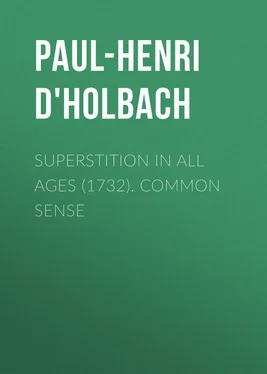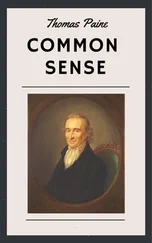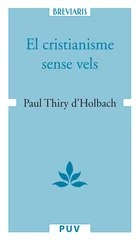Paul-Henri Holbach - Superstition In All Ages (1732). Common Sense
Здесь есть возможность читать онлайн «Paul-Henri Holbach - Superstition In All Ages (1732). Common Sense» — ознакомительный отрывок электронной книги совершенно бесплатно, а после прочтения отрывка купить полную версию. В некоторых случаях можно слушать аудио, скачать через торрент в формате fb2 и присутствует краткое содержание. Жанр: Философия, literature_18, foreign_prose, на французском языке. Описание произведения, (предисловие) а так же отзывы посетителей доступны на портале библиотеки ЛибКат.
- Название:Superstition In All Ages (1732). Common Sense
- Автор:
- Жанр:
- Год:неизвестен
- ISBN:нет данных
- Рейтинг книги:3 / 5. Голосов: 1
-
Избранное:Добавить в избранное
- Отзывы:
-
Ваша оценка:
- 60
- 1
- 2
- 3
- 4
- 5
Superstition In All Ages (1732). Common Sense: краткое содержание, описание и аннотация
Предлагаем к чтению аннотацию, описание, краткое содержание или предисловие (зависит от того, что написал сам автор книги «Superstition In All Ages (1732). Common Sense»). Если вы не нашли необходимую информацию о книге — напишите в комментариях, мы постараемся отыскать её.
Superstition In All Ages (1732). Common Sense — читать онлайн ознакомительный отрывок
Ниже представлен текст книги, разбитый по страницам. Система сохранения места последней прочитанной страницы, позволяет с удобством читать онлайн бесплатно книгу «Superstition In All Ages (1732). Common Sense», без необходимости каждый раз заново искать на чём Вы остановились. Поставьте закладку, и сможете в любой момент перейти на страницу, на которой закончили чтение.
Интервал:
Закладка:
Man is intelligent, hence it is concluded that he must be the work of an intelligent being, and not of a nature devoid of intelligence. Although nothing is more rare than to see man use this intelligence, of which he appears so proud, I will admit that he is intelligent, that his necessities develop in him this faculty, that the society of other men contributes especially to cultivate it. But in the human machine and in the intelligence with which it is endowed, I see nothing that shows in a precise manner the infinite intelligence of the workman who has the honor of making it. I see that this admirable machine is subject to derangement; that at that time this wonderful intelligence is disordered, and sometimes totally disappears; from this I conclude that human intelligence depends upon a certain disposition of the material organs of the body, and that, because man is an intelligent being, it is not well to conclude that God must be an intelligent being, any more than because man is material, we are compelled to conclude that God is material. The intelligence of man no more proves the intelligence of God than the malice of men proves the malice of this God, of whom they pretend that man is the work. In whatever way theology is taken, God will always be a cause contradicted by its effects, or of whom it is impossible to judge by His works. We shall always see evil, imperfections, and follies resulting from a cause claimed to be full of goodness, of perfections, and of wisdom.
XLIII. – HOWEVER, NEITHER MAN NOR THE UNIVERSE IS THE EFFECT OF CHANCE
Then you will say that intelligent man and even the universe and all it encloses, are the effects of chance. No, I answer, the universe is not an effect; it is the cause of all effects; all the beings it embraces are the necessary effects of this cause which sometimes shows to us its manner of acting, out which often hides from us its way. Men may use the word "chance" to cover their ignorance of the true causes; nevertheless, although they may ignore them, these causes act, but by certain laws. There is no effect without a cause.
Nature is a word which we make use of to designate the immense assemblage of beings, diverse substances, infinite combinations, and all the various motions which we see. All bodies, whether organized or not organized, are the necessary results of certain causes, made to produce necessarily the effects which we see. Nothing in nature can be made by chance; all follow fixed laws; these laws are but the necessary union of certain effects with their causes. An atom of matter does not meet another atom by accident or by hazard; this rencounter is due to permanent laws, which cause each being to act by necessity as it does, and can not act otherwise under the same circumstances. To speak about the accidental coming together of atoms, or to attribute any effects to chance, is to say nothing, if not to ignore the laws by which bodies act, meet, combine, or separate.
Everything is made by chance for those who do not understand nature, the properties of beings, and the effects which must necessarily result from the concurrence of certain causes. It is not chance that has placed the sun in the center of our planetary system; it is by its very essence, the substance of which it is composed, that it occupies this place, and from thence diffuses itself to invigorate the beings who live in these planets.
XLIV. – NEITHER DOES THE ORDER OF THE UNIVERSE PROVE THE EXISTENCE OF A GOD
The worshipers of a God find, especially in the order of the universe, an invincible proof of the existence of an intelligent and wise being who rules it. But this order is only a result of motions necessarily brought on by causes or by circumstances which are sometimes favorable and sometimes injurious to ourselves; we approve the former and find fault with the latter.
Nature follows constantly the same progress; that is to say, the same causes produce the same effects, as long as their action is not interrupted by other causes which occasion the first ones to produce different effects. When the causes, whose effects we feel, are interrupted in their action by causes which, although unknown to us, are no less natural and necessary, we are stupefied, we cry out miracles: and we attribute them to a cause far less known than all those we see operating before us. The universe is always in order; there can be no disorder for it. Our organization alone is suffering if we complain about disorder. Bodies, causes, beings, which this world embraces, act necessarily in the manner in which we see them act, whether we approve or disapprove their action. Earthquakes, volcanoes, inundations, contagions, and famines are effects as necessary in the order of nature as the fall of heavy bodies, as the course of rivers, as the periodical movements of the seas, the blowing of the winds, the abundant rains, and the favorable effects for which we praise and thank Providence for its blessings.
To be astonished that a certain order reigns in the world, is to be surprised to see the same causes constantly producing the same effects. To be shocked at seeing disorder, is to forget that the causes being changed or disturbed in their action, the effects can no longer be the same. To be astonished to see order in nature, is to be astonished that anything can exist; it is to be surprised at one's own existence. What is order for one being, is disorder for another. All wicked beings find that everything is in order when they can with impunity put everything into disorder; they find, on the contrary, that everything is in disorder when they are prevented from exercising their wickedness.
XLV. – CONTINUATION
Supposing God to be the author and the motor of nature, there could be no disorder relating to Him; all causes which He would have made would necessarily act according to their properties the essences and the impulsions that He had endowed them with. If God should change the ordinary course of things, He would not be immutable. If the order of the universe – in which we believe we see the most convincing proof of His existence, of His intelligence, His power, and His goodness – should be inconsistent, His existence might be doubted; or He might be accused at least of inconstancy, of inability, of want of foresight, and of wisdom in the first arrangement of things; we would have a right to accuse Him of blundering in His choice of agents and instruments. Finally, if the order of nature proves the power and the intelligence, disorder ought to prove the weakness, inconstancy, and irrationality of Divinity. You say that God is everywhere; that He fills all space; that nothing was made without Him; that matter could not act without Him as its motor. But in this case you admit that your God is the author of disorder; that it is He who deranges nature; that He is the Father of confusion; that He is in man; and that He moves man at the moment when he sins. If God is everywhere, He is in me; He acts with me; He is deceived when I am deceived; He questions with me the existence of God; He offends God with me. Oh, theologians! you never understand yourselves when you speak of God.
XLVI. – A PURE SPIRIT CAN NOT BE INTELLIGENT, AND TO ADORE A DIVINE INTELLIGENCE IS A CHIMERA
To be what we call intelligent, we must have ideas, thoughts, will; to have ideas, thoughts, and will, we must have organs; to have organs, we must have a body; to act upon bodies, we must have a body; to experience trouble, we must be capable of suffering; from which it evidently follows that a pure spirit can not be intelligent, and can not be affected by that which takes place in the universe.
Divine intelligence, divine ideas, divine views, you say, have nothing in common with those of men. So much the better! But in this case, how can men judge of these views – whether good or evil – reason about these ideas, or admire this intelligence? It would be to judge, to admire, to adore that of which we can form no idea. To adore the profound views of divine wisdom, is it not to worship that of which it is impossible for us to judge? To admire these same views, is it not admiring without knowing wry? Admiration is always the daughter of ignorance. Men admire and worship only what they do not understand.
Читать дальшеИнтервал:
Закладка:
Похожие книги на «Superstition In All Ages (1732). Common Sense»
Представляем Вашему вниманию похожие книги на «Superstition In All Ages (1732). Common Sense» списком для выбора. Мы отобрали схожую по названию и смыслу литературу в надежде предоставить читателям больше вариантов отыскать новые, интересные, ещё непрочитанные произведения.
Обсуждение, отзывы о книге «Superstition In All Ages (1732). Common Sense» и просто собственные мнения читателей. Оставьте ваши комментарии, напишите, что Вы думаете о произведении, его смысле или главных героях. Укажите что конкретно понравилось, а что нет, и почему Вы так считаете.












